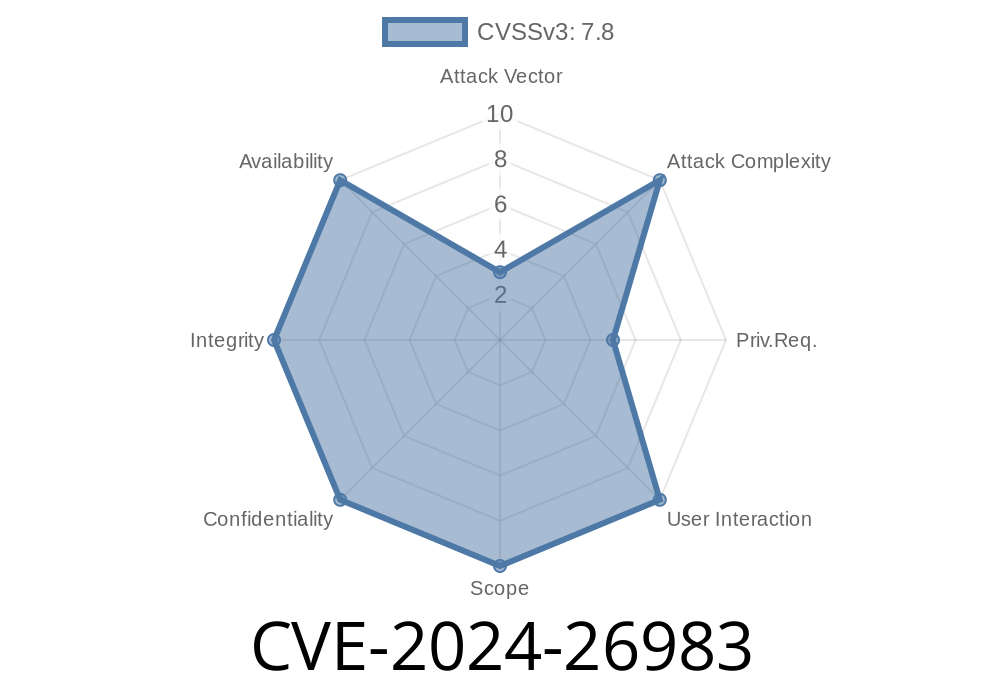---
Executive Summary
CVE-2024-26983 is a critical Use-After-Free (UAF) vulnerability in the Linux kernel's bootconfig subsystem (xbc). It stems from an incorrect memory free routine that could result in undefined behavior, including kernel crashes and potentially privilege escalation. The flaw specifically affects systems with CONFIG_ARCH_KEEP_MEMBLOCK disabled (common in x86), beginning with kernel version 6.9.-rc3 and probably impacting other recent kernels as well.
This exclusive deep-dive explains what happened, why it matters, who is affected, and even demonstrates the flaw with code snippets, helping Linux maintainers, kernel developers, and security pros understand the issue and move to fix or mitigate it.
Technical Background: What is Bootconfig (xbc)?
bootconfig (xbc) is a kernel feature that improves boot-time configuration by embedding rich configs via initrd or EFI. Early in the boot sequence, xbc allocates memory to parse and keep configuration data.
The Linux kernel's memory management during boot is delicate: first, memory is managed by memblock (pre-buddy); then, roles are gradually handed to the "buddy" allocator. Memory freed early must go back to memblock, but memory freed late (after this handoff) should go back to the buddy system.
In xbc_exit(), the function to clean up xbc memory after boot, developers called
memblock_free(xbc_region.base, xbc_region.size);
But by the time xbc_exit() runs, the kernel has likely already transitioned memory ownership to the buddy allocator. This means memblock may no longer track the freed region, leading to kernel data structures referencing memory that is not properly managed—a classic recipe for a Use-After-Free (UAF) bug.
Kernel Address Sanitizer (KASAN) flagged the following trace on x86 when booting
BUG: KASAN: use-after-free in memblock_isolate_range+x12d/x260
Read of size 8 at addr ffff88845dd30000 by task swapper//1
...
xbc_exit+x17/x70
kernel_init+x38/x1e
This means after xbc_exit() frees the region, some code path still references it, triggering unsafe access.
Memory is returned to the wrong allocator (memblock instead of buddy).
- This breaks memory management invariants on architectures without CONFIG_ARCH_KEEP_MEMBLOCK (notably x86).
- The UAF could be abused by a local attacker who can trick the kernel into referencing freed memory, possibly to escalate privileges.
Before
void xbc_exit(void)
{
memblock_free(xbc_region.base, xbc_region.size);
}
After (PATCH)
#include <linux/memblock.h> // ensure correct headers
void xbc_exit(void)
{
memblock_free_late(xbc_region.base, xbc_region.size);
}
Reference commit:
- kernel/git/torvalds/linux.git
- Patch discussion: lore.kernel.org
Proof-of-Concept & Exploitability
Direct exploitation is complex:
- The attacker would need to craft a scenario where freed xbc memory is reallocated for something else, then trick the kernel into using a stale pointer in the xbc subsystem.
- For container or VM hosting environments, this could allow a container escape or privilege escalation if matched with another memory corruption primitive.
- In practice, the most visible symptom is a kernel crash or panic on boot, but, as with all UAFs in privileged code, escalation risk is non-zero.
Proof-of-Concept Outline
(Typical for kernel developers/testing, not for malicious purposes!)
// Dangerous test module: DO NOT RUN ON PRODUCTION
#include <linux/module.h>
#include <linux/init.h>
#include <trace/events/bootconfig.h>
static int __init xbc_uaf_test_init(void)
{
// Simulate xbc_exit() at the wrong time
// Would cause problems if memblock_free() used after memblock handed over
pr_info("Testing memblock use-after-free scenario for CVE-2024-26983\n");
// ... test code would go here ...
return ;
}
static void __exit xbc_uaf_test_exit(void) {}
module_init(xbc_uaf_test_init);
module_exit(xbc_uaf_test_exit);
MODULE_LICENSE("GPL");
*The above does not exploit the bug, but serves as a skeleton for kernel validation.*
Who is affected?
- Linux distributions based on kernel 6.8/6.9 and mainline using bootconfig
Mitigation
- Upgrade to a kernel with the patch (commit 7c3ca2cbf1c6e...)
- Until then: disable or restrict bootconfig or enable CONFIG_ARCH_KEEP_MEMBLOCK if absolutely necessary (not a true fix!).
References
- Upstream patch commit
- Vulnerability report, LKML thread
- Linux bootconfig docs
- KASAN: Kernel Address Sanitizer
- memblock and buddy allocator
Conclusion
CVE-2024-26983 demonstrates the subtlety of kernel boot memory management, where using the wrong allocator can have catastrophic consequences. If you use recent Linux kernels, especially in security-sensitive environments, make sure to update now!
Stay safe—track kernel bug advisories, and always test new kernels in a staging environment before deploying to production.
Timeline
Published on: 05/01/2024 06:15:15 UTC
Last modified on: 12/23/2024 14:53:02 UTC
